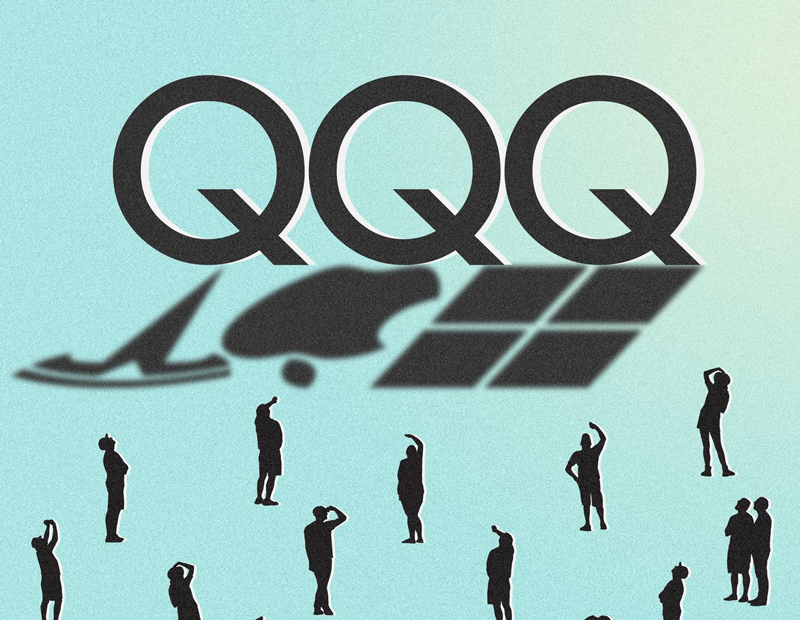Young ETF Buyers Discover the Tech Sector’s Old Friend, the QQQ

Rebalance’s Managing Director Mitch Tuchman talks to Wall Street Journal about the latest ETF phenomenon, and why it’s important not to have a narrow scope when considering your investments.
Everything old is new again in the markets, even popular exchange-traded funds.
Take QQQ, the giant tech-focused ETF run by investment manager Invesco Ltd. Launched 22 years ago at the height of the dot-com boom, the fund has in recent months grabbed the attention of a new generation of investors via Reddit’s Wall Street Bets and other online investing communities.
The fund’s concentration in the high-growth stocks billed as “innovative” and “disruptive” in the lingo of the day—it tracks the Nasdaq-100—has made it a favorite of those looking to capitalize on the accelerated shift to working from home. The shares have surged 90% over the past year, and assets in the fund have soared to a recent $150 billion, making it one of the largest ETFs anywhere.
Michael Bowers, a 21-year-old Colorado college student, first heard about QQQ on the Reddit forum WallStreetBets. He bought $1,000 worth of fund shares last summer because the ETF tracks companies he knows and whose products he uses, ranging from Apple to Facebook.
“When QQQ was rising a lot, it got talked about a decent amount [on Reddit] and it led me to look into it,” he said. “My main love for stocks lies in investor sentiment and hype, basically. I’m invested in reading and seeing what people are talking about, what people are wearing and using, what will succeed in the future.”
Arihant Jain, a 31-year-old technical sales engineer who owns almost $3,500 in QQQ shares, shares that enthusiasm.
“QQQ is at the top of my list because of the diversity and exposure” of its holdings, said Mr. Jain, whose QQQ shares are his largest ETF investment. Mr. Jain bought the shares when opening his first investing account with Social Finance Inc. in 2018. “Last year we saw the reliance on tech, be it for work or connecting to their loved ones,” he said.
Mr. Jain’s interest illustrates how the QQQ has come to embody one of the signature trends of the current market moment: young investors’ embrace of tech investing via online trading whose falling costs have given rise to tools that didn’t exist before.
Some of these investors sock away, say, $100 a month for investing purposes, a sum that before the collapse of trading commissions and the rise of fractional share purchases would have put some casual QQQ investments (recent share price: $319) off limits. Now, SoFi estimates about one-quarter of its clients’ fractional buys are ETFs, with QQQ being one of its most popular.
Messrs. Bowers and Jain aren’t alone. On Reddit groups like r/investing and r/stocks, new investors often post asking how much to invest in QQQ—or “the Q’s” as some call it—with others in the comments offering advice and discussing the fund’s past performance.
The surge in interest among Reddit users and Robinhood traders has presented an opportunity to Invesco, an Atlanta-based investment manager. Invesco has stepped up marketing spending in a bid to cash in on QQQ’s moment, sponsoring for instance a March Madness-themed “QQQ Hoops” game that gives you the opportunity to shoot hoops, showing off the potential performance of investments. Marketing spend for QQQ was $66.8 million in 2020, compared with $19.6 million for State Street’s SPDR S&P 500 ETF Trust, according to the State Street prospectus.
“This is an investor who likes the product because of access to innovation,” said Emily Pachuta, chief marketing and analytics officer of the Americas at Invesco.
Young investors’ embrace of QQQ has so far been an unalloyed success story, but that won’t last forever. For one thing, tech shares have started to fade out of favor following a long run, fueling more than $1 billion of outflows from the QQQ fund for 2021.
Should the market continue to embrace so-called cyclical shares whose success is more tied to the economic recovery, such as Ford Motor Co. or JPMorgan Chase & Co., QQQ holders could face significant declines in the value of their holdings. With any luck, analysts say, a further pullback in tech shares should highlight for QQQ holders the value of diversifying their investment portfolios beyond what has been the hottest sector for some time.
”They’re very focused on this narrow sector that’s growing like crazy, but I could spend an hour talking about what they’re not invested in,” said Mitch Tuchman, chief investment officer at Rebalance, an investment management firm.
Those lessons are often hard won, however. Mr. Bowers’s father cautioned him against getting swept up in market hype, so three months ago he sold most of a position whose value had grown to $5,000, retaining only his initial investment. He turned around and invested the bulk of his money in Riot Blockchain Inc., a blockchain technology firm and bitcoin “miner.”
“I don’t want to lose everything, but I like playing risky,” he said.






